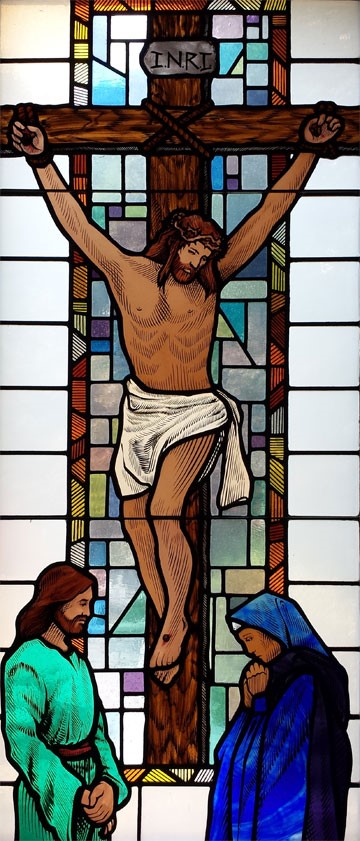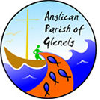Good Friday
When I survey the wondrous cross
On which the Prince of glory died
My richest gain I count but loss
And pour contempt on all my pride.
Hymn writer, Isaac Watts, poetically states for the Christian that the cross is the centre of everything – nothing else matters. Put another way, everything else only matters in reference to the cross. Our richest gain is as nothing, compared to what God does on the cross.
The cross is horrific. There is no escaping that fact. It is something we would rather not face. Jesus felt the same. We are told in the garden of Gethsemane he was “grieved and agitated”. He says to his disciples “I am deeply grieved, even to death”. Jesus three times prays to God for a way out – “My Father, if it is possible, let this cup pass from me.” And later on “My Father, if this cannot pass unless I drink it, your will be done”. And then we are told he prayed the same words a third time.
Jesus wants another way to serve God. His prayer is like many prayers we have uttered in times of extreme difficulty – we may not have said “let this cup pass from me” – we have probably prayed something like: take this all away, save me, make it all stop, give me a break, it’s all too much, I can’t take it anymore. This is the prayer of desperation and it is probably as honest as our prayers ever get. Jesus then adds something more to his prayer. If this situation cannot pass, your will be done. This is his acceptance of the terrible reality he faces. He is saying to God – if this is how things are, then please may something of your goodness, your purpose, your presence, your light be in it somewhere. May some good come out of it. In this prayer, Jesus hands himself over to the grace of God.
Our two most basic human instincts when faced with danger and difficulty are fight or flight. Jesus shows us another way, the way of acceptance. And so whilst he doesn’t seek the cross (he doesn’t have a death wish) rather he accepts the cross, and places his trust in God in that most horrific of situations.
Former Anglican Dean of Johannesberg and anti-Apartheid activist Gonville ffrench-Beytagh, was arrested and tried for subversion and convicted but later released. In his book, written in 1975, Encountering light, he speaks of the centrality of the cross.
“God is love, and on the cross he demonstrates this to the uttermost. But of course, it is not only God who has to sacrifice. I must also go to meet him. This is what that phrase, which gets used so glibly, about ‘taking up the cross’ means. The cross is the symbol of total sacrifice, of the breaking down of obstacles to love at whatever cost, and it is just not possible to claim to be a Christian while doing our best to evade the cross. We all do it of course, and sometimes we use a great deal of skill and effort in the process. We dance all round the cross, trying to escape a discipline, a costly decision, a situation where we are going to look fools or whatever it may be. We all see pain and suffering and demands on our patience or time as things to be avoided if we can, whereas if we were truly Christian we would see them as means, voluntary or involuntary, of sacrifice – of setting aside those things in ourselves which are obstacles to love” Encountering Light, Gonville ffrench-Beytagh (1975)
Wow! Perhaps that’s just a more complete way of saying – “My richest gain I count but loss and pour contempt on all my pride”. In a society that sees success as personal power, wealth and beauty the “cross is foolishness” as St Paul says. But Paul goes on to reassure us “that God’s foolishness is wiser than human wisdom, and God’s weakness is stronger than human strength.”
Jesus’ journey to the cross, involves betrayal by a friend, denial by another, torture, injustice, taunting and murder. Jesus is abandoned by most of his followers and even, it seems, abandoned by God. He cries out “Eli Eli lema sabachthani? My God, my God, why have you forsaken me?” – which on the face of it sounds like total despair and loss of faith. Except that it’s not – it is a prayer. Loss of faith would not require addressing God at all. Instead Jesus prays these words from Psalm 22 – a prayer from the tradition of faith – drawing on the communal power of a faith that knows that even when all seems totally lost, God’s purposes are still at work. As Jesus prayed in Gethsemane, “if this cup cannot pass from me, your will be done.” In whatever guise suffering may come to us, I believe God is present and at work in the midst of it – the Cross of Christ teaches me that.
We each come to the cross today with our own weights and burdens. They may be personal or global. World tensions over Syria and North Korea scare us. Individually pressures of finances or health or relationships may weigh us down. Whatever our struggles, we do what we can to responsibly manage them, but beyond what we are able to manage by ourselves, are those the things bring us to the foot of the cross. And here Jesus shows us, with arms outstretched, his acceptance – if this cup cannot pass, thy will be done.
We come here to meet Christ in his sacrifice, to behold the wondrous cross, and to stop our running from the cross, our fighting against it, and to accept that we must come with open hearts to simply allow God to be at work. We gaze with faith upon the cross, (it is our cross, it is the world’s cross) and we see and trust that in this cross, God’s will can be done. No matter how remote that thought seems, no matter how abandoned we feel. God’s will can be done.
For here on this cross, although it doesn’t seem to be so,
but is, in faith, especially so – God is love.
God is love!
Ven Andrew Mintern 14th April 2017
Continue viewing more sermons in the 2017 Series of Easter Sermons by Ven. Andrew Mintern
